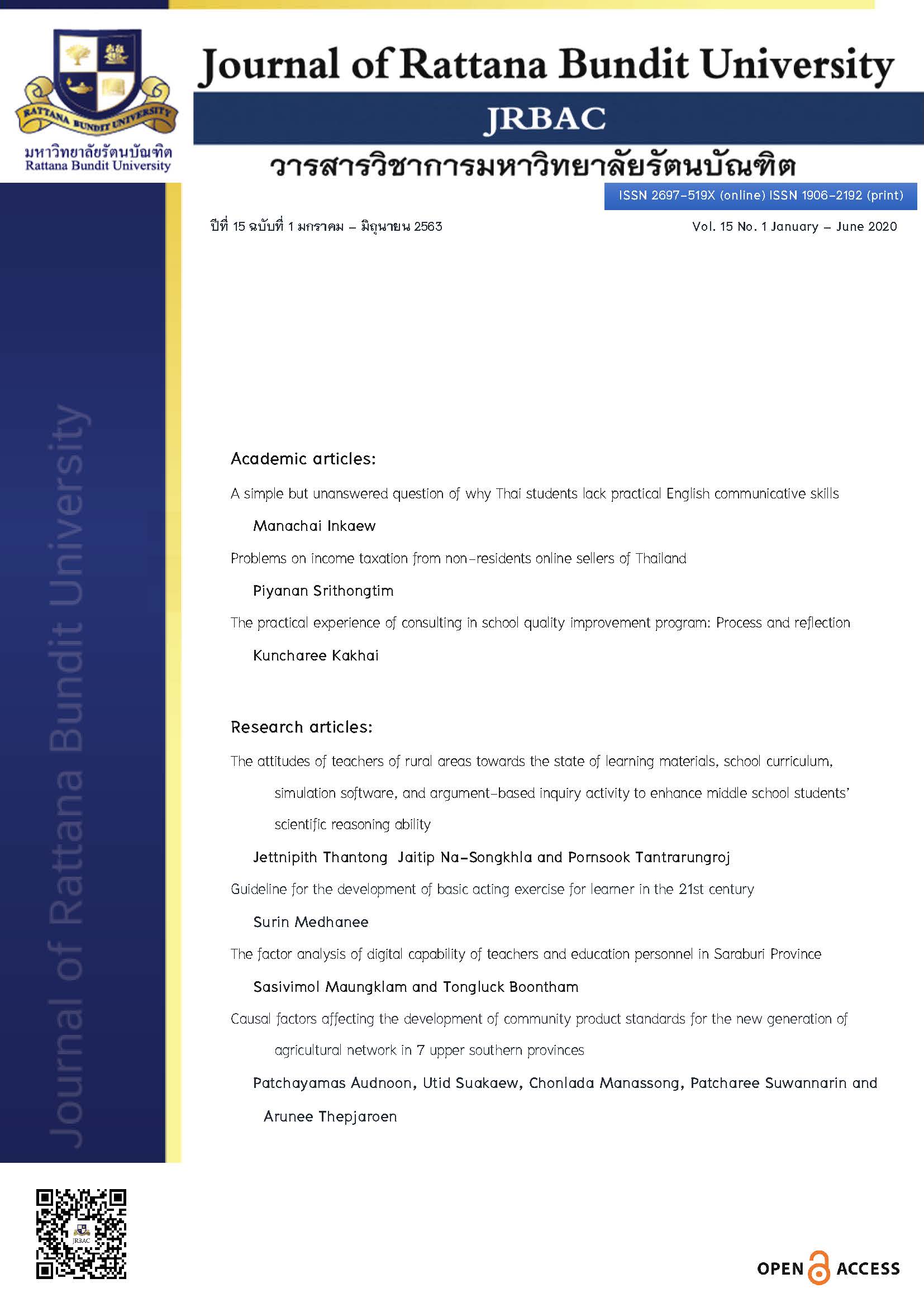A simple but unanswered question of why Thai students lack practical English communicative skills
Main Article Content
Abstract
The focus of this article is on a simple question raised to ask about the current situation of English communicative skills among Thai students with an aim to see an increasing number of Thai citizens communicating in English efficiently, particularly in the marketplace environment. Even though the question examined in this paper is not a new issue in Thai society as it has been elevated among the public for several decades, it is worth investigating when time has flown to the third decade of the 21st century to see the progress of the English communication phenomenon in Thailand with a hope that the findings, in a certain degree, would be useful for English teaching and learning in a Thai context. Several current news reports, surveys and research were explored to examine recent English usage circumstances. Although the results of the discovery were relatively unsatisfactory compared with hard efforts that have been tremendously dedicated to this problematic issue, the investigation presented in this paper together with useful perspectives and the disclosed roots of the problems could be the voice of a Thai English teacher who was trying to offer some viewpoints and factual information to the authority to look back onto the country’s unsolved matter seriously.
Article Details
References
Adecco. (2020). Adecco Thailand reveals 2020 salary rates for more than 800 positions. Retrieved fromhttps://adecco.co.th/th/knowledge-center/detail/salary-guide-2020
Astaman, A. (2009). Motivating the reluctant language learner. Retrieved from http://lanacometorich.blogspot.com/2009/07/motivating-reluctant- languagelearner.html
Baker, W. (2012). English as a lingua Franca in Thailand: Characteristics and implication. English in Practice,1, 18-27.
Baker, W. & Jarunthawatchai, W. (2017). English language policy in Thailand. European Journal of Language Policy, 9(1), 27-44.
British Council helps train Thai English-language teachers. (2018). Retrieved from https://www.bangkokpost .com/thailand/general/1548446/british-council-helps-train-thai-englishlanguage-teachers
Council of Europe. (2020). The CEFR Levels: Global scale - Table 1 (CEFR 3.3): Common Reference levels. Retrieved from https://www.coe.int/web/common-european-framework-reference-languages/ table -1-cefr-3.3-common-reference-levels-global-scale
Education First. (2019). The world's largest ranking of countries and regions by English skills: English Proficiency Index; Thailand (9th ed.). Retrieved from https://www.ef.co.th/epi/regions/asia/thailand/
English of Thai people in ASEAN. (2014). Retrieved from https://th.jobsdb.com/th-th/articles/อังกฤษคนไทย-อาเซียน/
Gardner R. C. (1985). The role of attitudes and motivation. London, Great Britain: Edward Arnold.
Gardner, R. C. (2006). Motivation and second language acquisition: The socio-educational model. New York, NY: Peter Lang Publishing.
Jenkins, J. & Leung, C. (2014) ‘English as a lingua Franca’, In A. Kunnan (ed.), TeCompanion to Language Assessment. Malden, MA: John Wiley and Sons.
Mala, D. (2018). Thai English proficiency drops. Retrieved from https://www.bangkokpost.com/thailand/ general/ 1570042/thai-english-proficiency-drops (in Thai)
McNamara, T. (2014). ‘30 years on evolution or revolution?’. Language Assessment Quarterly, 11(2), 226–32.
The Nation. (2018). New approach to teaching English already shows results. Retrieved from https://www.nationthailand.com/news/30355408
Noom-ura, P. (2017). English-teaching problems in Thailand and Thai teachers’ professional development needs. English Language Teaching, 6(11), 139-147. (in Thai)
Office of Academic Affairs and educational standards. (2014). The promotion of language teaching. Retrieved from http://english.obec.go.th/english/2013/index.php/th/2012-08-08-10-26-5/60-2014-04-05-08-29-13
Office of the Higher Education Commission. (2016). Retrieved from http://www.mua.go.th/users/bhes/ front_home/Data%20Bhes_2559/04052559.pdf
Oxford, R. (1999). Variables, individual, in Language Learning: Classroom implications. The Encyclopedia of Language and Linguistics, 9, 4896-4899.
Phongsirikul, M. (2017). A learner of the 20th century becoming a teacher of the 21st century: A perspective on the goals of ELT in Thailand. rEFLections, 8, 81-94. (in Thai)
Rappa, A. L. & Wee, L. (2006). Language policy and modernity in Southeast Asia: Malaysia, the Philippines, Singapore and Thailand. New York, NY: Springer.
Rod, E. (1997). Second language acquisition. HK: Oxford University Press.
Royal Thai Government Gazette. (2015). The act on salary, financial qualifications and placement allowances teacher civil service and educational personnel Issue No. 3 B.E. 2015. Retrieved from http://www.ratchakitcha.soc.go.th/DATA/PDF/2558/A/043/7.PDF
Sakworawich, A. (2015). Where is the Thai children future when Thai they get disqualified persons to be their teachers? Retrieved from https://mgronline.com/daily/detail/9580000007751
Seifert, T. (2004). Understanding student motivation. Educational Research, 46(2), 137- 149. DOI: 10.1080/0013188042000222421
Tauycharoen, P. (2006). Thai students’ potential in learning English and its deterrence variables. Journal of Liberal Arts, Thammasat University, 6(1), 67-98. (in Thai)
Thepsiri, K., & Pojanapunya, P. (2012). Remedial students’ attitudes towards English language learning and their causal attributions for success or failure. Humanities & Social Sciences, 29(1), 25-50. (in Thai)
Thumthong, B. (2003). Thai teachers in the 21 century. Retrieved from https://www.moe.go.th/moe/ upload/hotnews/htmlfiles/9307-1423.html
Weiner, B. (1985). An attributional theory of achievement motivation and emotion. Psychological Review, 92(4), 548-573. DOI: 10.1037/0033-295X.92.4.548
Zhu, Q. (2014). Motivation for a second or foreign language learning. SHS Web of Conferences, 6, 04004. DOI: 10.1051/shsconf/20140604004


